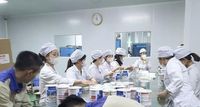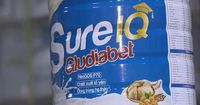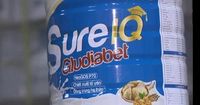In a significant crackdown on counterfeit food production, Vietnamese authorities have arrested eight individuals linked to the production and distribution of nearly 600 fake milk powder brands. This operation, led by the Ministry of Public Security, has raised serious concerns regarding public health and safety, especially as many of the products were aimed at vulnerable populations, including individuals with diabetes, kidney failure, premature infants, and pregnant women.
According to the Ministry of Public Security, the arrested individuals include Vu Manh Cuong and Hoang Manh Ha, who are accused of masterminding the operation through their companies, Rance Pharma International Pharmaceutical Joint Stock Company and Hacofood Group Pharmaceutical Nutrition Joint Stock Company. Both companies were established to exploit the growing demand for nutritional products in the domestic market, particularly milk powder.
The investigation revealed that between August 2021 and April 2025, the two companies produced 573 different brands of counterfeit milk powder, generating revenue close to 500 billion VND (approximately 21 million USD). The products were marketed with claims of containing high-quality ingredients, such as bird's nest extract and cordyceps, but investigations showed that these claims were false. In fact, tests indicated that the nutritional content of some products was as low as 30-70% of what was advertised.
Authorities began their investigation after receiving reports of suspicious activities surrounding these companies. The initial findings confirmed that Rance Pharma and Hacofood Group operated with significant irregularities in their financial and accounting practices, leading to serious violations of legal standards. The police agency has since indicated that these violations resulted in over 28 billion VND in damages to the state budget.
The companies were established with an initial charter capital of 10 billion VND each, but they quickly increased their capital, with Rance Pharma reaching 52 billion VND by June 2024. This rapid expansion raised red flags among regulatory authorities. In January 2024, Rance Pharma's legal representation changed hands, with Nguyen Thanh Luan taking over as director. Similarly, Hacofood Group saw changes in its leadership, with Nguyen Van Tu becoming the legal representative in October 2024.
As part of the investigation, authorities executed search warrants at 19 locations associated with the suspects, seizing 84 different types of counterfeit milk powder products, totaling 26,740 cans across 90 production batches. The police have stated that this operation was not just limited to the two companies; it also involved a network of nine additional businesses established to facilitate the production and distribution of the counterfeit products.
These nine companies, which include names like International Pharmaceutical Group Joint Stock Company and Big Four Pharma International Pharmaceutical Joint Stock Company, were created to help cover the tracks of the counterfeit operations and provide a facade of legitimacy to the illegal products being marketed.
The investigation has highlighted the sophisticated methods employed by Cuong and Ha to run their operations, which included forming joint ventures with other entities to expand their reach and influence in the market. Their approach involved a systematic strategy to create a robust ecosystem of companies that would support the production and distribution of counterfeit milk powder.
In addition to the main suspects, six other individuals have been arrested as part of the investigation. These include key figures in the companies who played significant roles in the production and management of the counterfeit operations. The Ministry of Public Security has committed to expanding the investigation further, aiming to uncover the full extent of the operation and hold all responsible parties accountable.
Health officials have expressed grave concerns about the implications of this counterfeit milk powder on public health, particularly for vulnerable groups who rely on these products for nutritional support. The products falsely marketed as beneficial could lead to serious health risks, including malnutrition and adverse health effects.
The case has sparked outrage among consumers and health advocates, who are calling for stricter regulations and enforcement measures to prevent such incidents in the future. The Ministry of Public Security has assured the public that they are taking this matter seriously and will continue to investigate and prosecute those involved in the production and distribution of counterfeit food products.
This incident serves as a stark reminder of the potential dangers posed by counterfeit food products and the need for vigilant oversight in the food industry. As authorities continue their investigation, consumers are urged to remain cautious and informed about the products they purchase, especially those marketed towards vulnerable populations.
The ongoing legal proceedings against the accused will likely take center stage in the coming months as the Ministry of Public Security seeks to bring justice for those affected by this extensive counterfeit operation.








